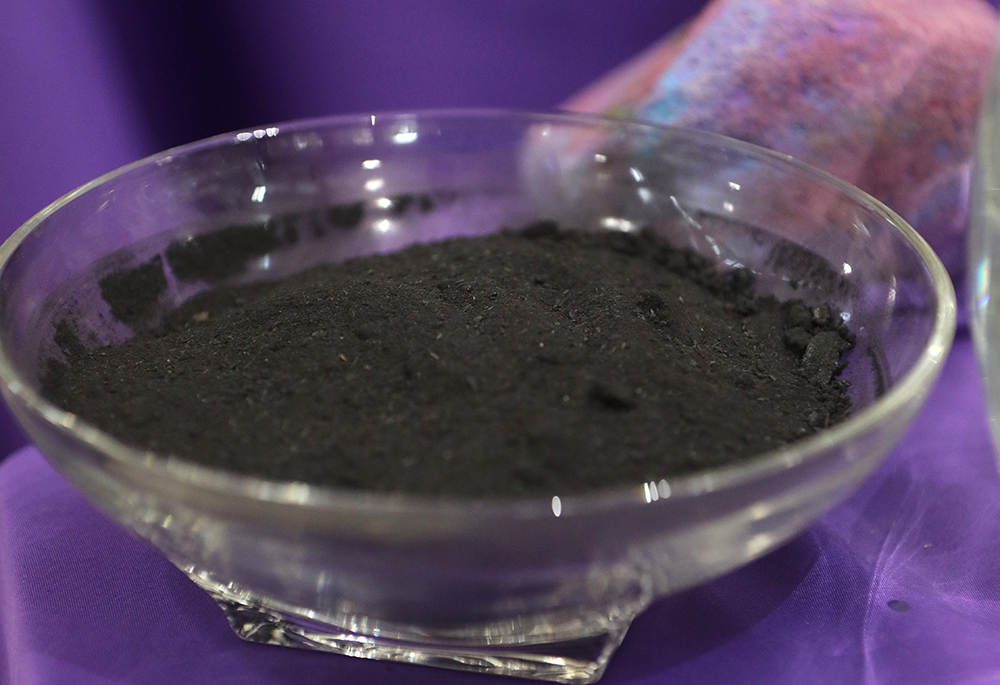
Ashes are pictured in a display on the altar during Lent at Jesus the Good Shepherd Church April 7, 2022, in Dunkirk, Maryland. Ash Wednesday, Feb, 14, 2024, marks the beginning of the 40-day penitential season of Lent. (OSV News/CNS file, Bob Roller)
In the winter of 2013 I sat down to make my New Year's resolution. I had struggled with weight and body image since I was a kid, but in 2013 I wasn't a kid anymore. I was a teacher, and as I contemplated the new me I could sculpt in the new year, I had a stroke of genius: I would "lesson plan" my way into shape.
I can still picture the calendar I made, the promise of January 2014 sketched out in black and white before me. I set my goal at that date and planned backwards from there, creating daily activities and weekly assessments. I had singlehandedly solved New Year's resolutions.
In some ways, what happened next was predictable. The lesson plan, detailed as it was, lasted a day. Maybe two. Either way, it ended in failure.
Something else happened though, something I didn't expect: The feeling of failure didn't fade with time. Not by the end of January. Not even by the end of the year. It weighed on my heart, hardening into something cold and heavy as stone. I haven't made a New Year's resolution since.
Today, the season of Lent is upon us. To my stone heart, Lent often feels like "New Year's Resolutions: Part II." It's a sequel released too soon, another call to consider our faults, another failure threatening to turn to stone. It's no coincidence in the decade since my New Year's lesson plan I've neither made nor kept a meaningful Lenten practice either. Instead of walking God's path, I've chosen to lay my own using my failures as stepping stones. It's a path that takes me nowhere new, only back and forth, tracing and retracing my own missteps.

(Unsplash/Sam Barber)
This goes far beyond one failed New Year's resolution or botched Lenten fast. It's the way I've walked through life. I carry my failures with me, telling myself that I'll cut them and shape them. I'll set them in my heart just right and polish them up. I'll make them beautiful, and then I, too, will be beautiful. It's the way much of our society tells us to live: To make yourself better, focus on your faults. Turn your failures into stepping stones.
It sounds good; or, at least, it sounds motivating. There's just one problem: Christ doesn't call us to have hearts of stone. In fact, Ash Wednesday reminds us it's quite the opposite.
Christ doesn't call us to have hearts of stone. In fact, Ash Wednesday reminds us it's quite the opposite.
We are not handed stones today. We are painted with ashes, coarse but soft. Ashes are not heavy. They are not burdensome. While ashes invite us to consider our failures, they do so by inviting us to accept those failures, bear them for a time and then wash them away. This is a rhythm of mercy, a practice of softening.
In the parable of the sower (Matthew 13:1-23), Jesus compares a heart receptive to the word of God to good soil, ground in which the seed of God's word is able to grow deep roots and bear much fruit. In other words, Christ asks us to soften and receive. We are not the farmers in this story, called to plow or sow or reap. We are the soil, called to a practice of softening by treating ourselves with the same mercy Christ himself treats us with.
Advertisement
For many of us, letting go of our failures feels like giving up. After all, dwelling on them often feels like our only hope for change, as though we can make everything better if we just try a little harder. In this way, we make hardening a habit.
But this Lenten season, what if we made a practice of softening instead? The only resolution I am making for these next 40 days is to pray this simple prayer: Lord, soften my heart. It is a prayer of patience, of waiting and of mercy. It is a proper prayer for ashes and soil and softening.
I may not ever be able to lift the stones I've laid for myself, but if I can invite God to soften the soil around them, perhaps they will crack just enough for something new to grow.

(Unsplash/Fabian Kleiser)





